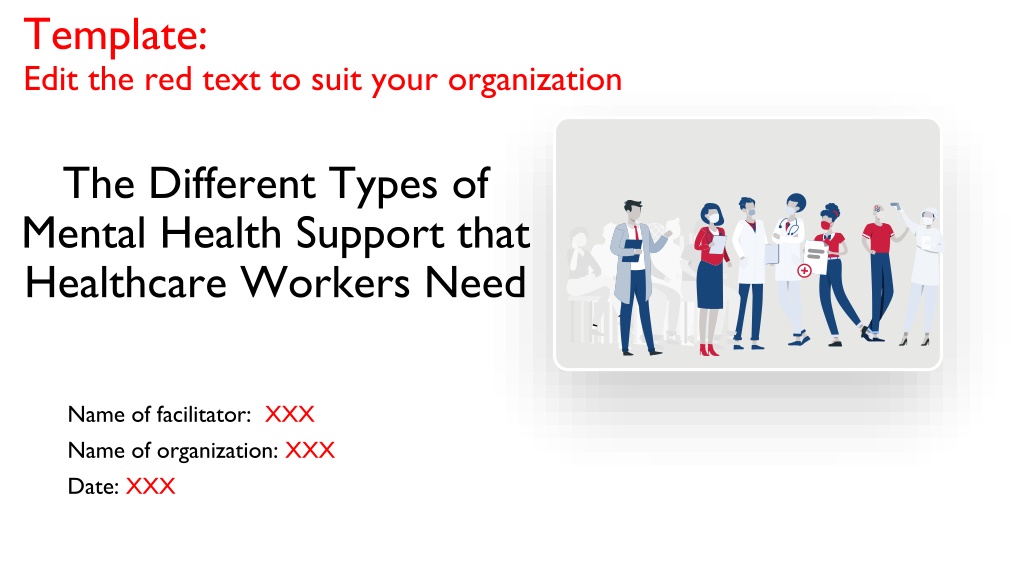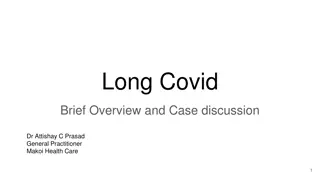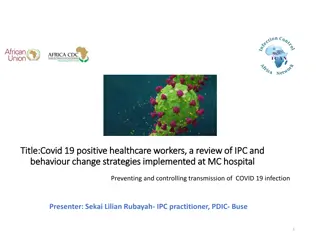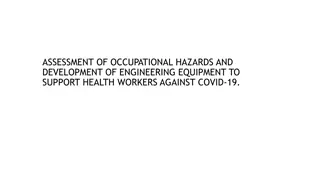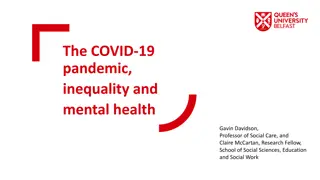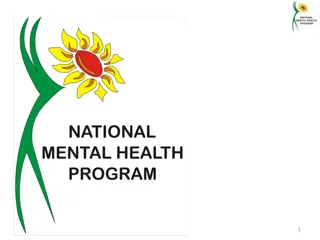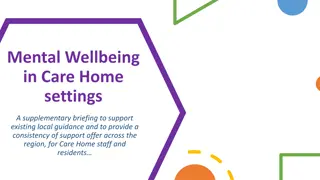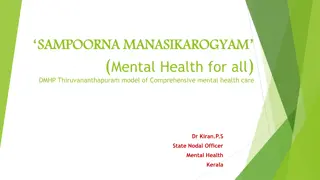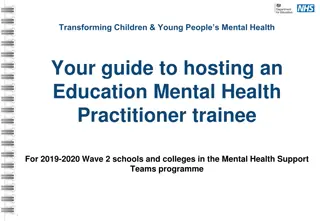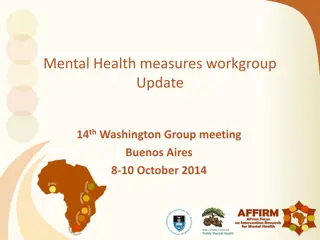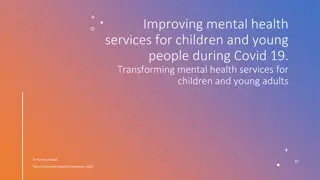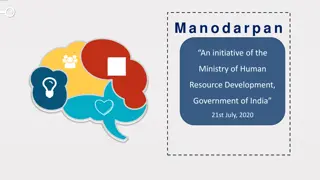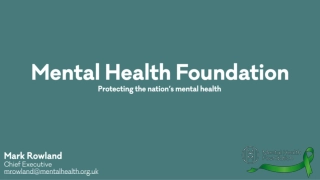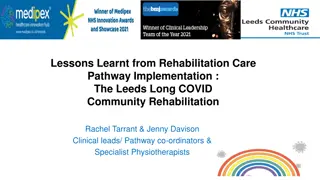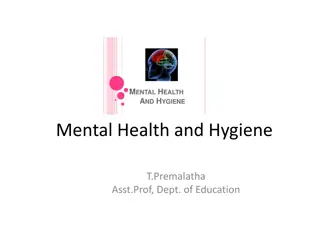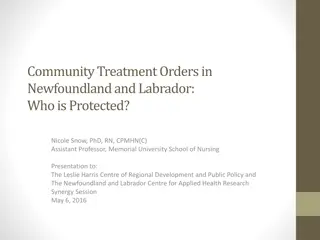Supporting Mental Health Needs of Healthcare Workers During COVID-19
Discussing the crucial mental health support required by healthcare workers amidst the COVID-19 pandemic. Insightful information on the different types of support needed, including coping with stress, dealing with loss, and managing chronic mental health illnesses. Understanding the impact of COVID-19 on mental health and the importance of addressing these challenges for the well-being of healthcare professionals.
Download Presentation

Please find below an Image/Link to download the presentation.
The content on the website is provided AS IS for your information and personal use only. It may not be sold, licensed, or shared on other websites without obtaining consent from the author. Download presentation by click this link. If you encounter any issues during the download, it is possible that the publisher has removed the file from their server.
E N D
Presentation Transcript
Template: Edit the red text to suit your organization The Different Types of Mental Health Support that Healthcare Workers Need Name of facilitator: XXX Name of organization: XXX Date: XXX
Objectives Discuss mental health in the context of the COVID-19 pandemic Discuss the different mental health support needs: 1. Support for all healthcare workers to function optimally 1. Support for a specific stressful event (e.g., death of a family member) 1. Support for chronic mental health illnesses
Some ground gules Before we start our discussion, let s set some ground rules. We are going to discuss sensitive topics. There might be differences in our opinions. There is no right and wrong. So let s hear each other, without taking it personally. The point of this discussion is not to necessarily agree, but to reflect together.
Recapping: What is mental health? Mental health is a dynamic concept, it is an integral and essential component of general health. The World Health Organization (WHO) constitution states, Health is a state of complete physical, mental, and social well-being, and not merely the absence of disease or infirmity. An important implication of this definition is that mental health is more than just the absence of mental disorders, or disabilities. Mental health is a state of well-being, in which an individual realizes his or her own abilities, can cope with the normal stresses of life, can work productively, and is able to make a contribution to his or her community. Mental health is fundamental to our collective and individual ability to think, emote, interact with each other, earn a living, and enjoy life. The promotion, protection, and restoration of mental health can be regarded as a vital concern of individuals, communities, and societies throughout the world. (Source: World Health Organisation. Mental Health: strengthening our response. March, 30 2018. https://www.who.int/en/news-room/fact-sheets/detail/mental- health-strengthening-our-response)
Mental health in the context of the COVID-19 pandemic The COVID-19 pandemic has had an impact on our lives personally and professionally. COVID-19 regulations such as avoiding social gatherings and ensuring social distancing are important public health interventions to mitigate the spread of COVID-19, but they can make us feel lonely and isolated from the ones we love. As healthcare workers, we are expected to be more affected by mental health issues due to increased workloads, higher exposure to the virus, witness deaths and extreme suffering, experience stigmatization, and face difficult moral decisions ( moral injury ) about scare supplies that can result in life-and-death situations for patients and peers. (Sources: Centers for Disease Control and Prevention. Coping with Stress. Jan 22, 2021. https://www.cdc.gov/coronavirus/2019-ncov/daily-life-coping/managing-stress-anxiety.html; UNAIDS Joint United Nations Programme on HIV/AIDS. 2020. UNAIDS Data 2020. UNAIDS. https://www.unaids.org/en/resources/documents/2020/unaids-data.)
Discussion on mental health Why is it important for a healthcare worker to access mental health support? What different types of mental support needs may healthcare workers require?
Mental health support needs There are three distinct mental health support needs. 1. Support to function optimally 1. Support for a specific stressful event (e.g., death of a family member) 1. Support for chronic mental health disorders
1. Support for all healthcare workers to function optimally When we function at our very best in our work - we directly impact the care that our clients receive. What kind of support have you received that has helped you to perform your work at your best?
2. Support for a specific stressful event An example of a specific work-related stressful event is if a healthcare worker visited a home and sees that children do not have food. Do you think it is important to seek mental health support when you experience a specific stressful event? If you think it is important, why is it so? If you don t think it is necessary, please share your thoughts with us.
3. Support for chronic mental disorders There are many different mental disorders, with different presentations. They are generally characterized by a combination of abnormal thoughts, perceptions, emotions, behavior, and relationships with others. Mental disorders include: depression, bipolar disorder, schizophrenia, and other psychosis. How do you think that seeking mental health support for a chronic mental health disorder will help an individual function optimally and also provide quality of care to clients? (Source: WHO webpage: https://www.who.int/news-room/fact-sheets/detail/mental-disorders)
Recapping the different types of mental health support needs There are different types of mental health support needs. 1. Support for all healthcare workers to function optimally 2. Support for a specific stressful event (e.g., death of a family member) 3. Support for chronic mental health disorder Each of these mental health needs are distinct; however, we need to respond to each one effectively so that we can care for ourselves and provide quality of care to our clients.
The contact for mental health support: Contact name: XXX Position of the point of contact: XXX Mobile number of the point of contact: XXX Office number of the point of contact: XXX Email address of the point of contact: XXX
Thank you Your organization logo here
